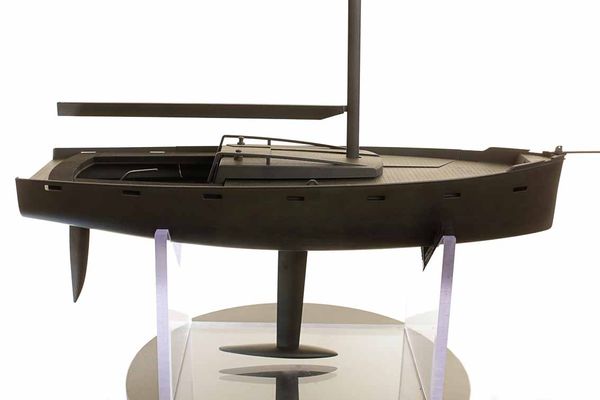Livrea Yacht Italia is plotting a new course for traditional sailing vessels, combining the traditional artisanal elegance of Italian boatbuilding with cutting-edge digital design and 3D printing.
Harmonizing Tradition and Technology to Build a Better Yacht
Cofounders Daniele Cevola and Francesco Belvisi are hard at work on the Livrea26, a 26-foot day sailer based on traditional lancia fishing vessels from the tiny island of Pantelleria, which sits in the Mediterranean between Sicily and the coast of Tunisia.
Even though the finished product evokes the clean lines of the traditional 17-foot lancia, naval architect Cevola and engineer Belvisi are using digital design, 3D printing, and precision CNC manufacturing techniques for modeling and prototyping. The boatwrights have also embraced modern materials such as carbon fiber and kevlar where they are appropriate. Over time, the two men expect to use these high-tech methods and components for more and more of their manufacturing, while always preserving the classic aesthetic of their boats.
Preserving Italian Heritage by Bringing It into the 21st Century
Belvisi, who was born on Pantelleria, joined forces with Cevola to bring the boatbuilding heritage of the island into a new era after the last builder of the traditional lancia died a few years ago.
The cofounders, who live in different cities, use Fusion 360 to collaborate as they create their designs. They started by taking measurements of traditional boats and creating models within Fusion 360, and from there have worked within the software on every aspect of the process, from sketching the whole boat, to designing individual parts, through the entire process of 3D printing, and on to programming for CNC milling. “You need only one software for solving your problems,” Cevola says. “This is a real revolution for design.”
As Belvisi puts it, “It’s a strange way of working, because we make a classical boat with exactly the same wooden parts, but using a modern drawing system and modern manufacturing methods.”
A New Type of Company for a New Type of Boat

Meanwhile, the actual manufacture of the boats is carried out in a workshop that employs young people from difficult backgrounds. It’s a way of teaching traditional work as well as technology skills in a good working environment, yet all while keeping costs under control.
Market interest in Livrea’s boats is strong, but Belvisi says that their work has passed an even harder test: “When we talk with traditional boat builders [in Sicily], they don’t believe it is possible to make the same things without using their own hands. But when they see [our] results, they understand.”
High Technology Meets Artistic Passion
For Cevola, the process of creation is hardly an intellectual exercise. “It’s emotion,” he says. “Because when you have in your mind your product, it is an emotion. When you see a rendering, it’s another emotion. But when you see your boat, [like it’s] your little son on the water, that’s real emotion.”

